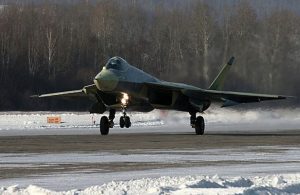
Russia’s Sukhoi T-50 made its first official flight on January 29 from Sukhoi/KnAAPO’s Komsomolsk-on-Amur facility in Siberia’s far east.
The T-50 is the prototype of the next generation PAK-FA (Perspektivnyi Aviatsionnyi Kompleks Frontovoi Aviatsy, or Future Frontline Aircraft System) under development for Russia and possibly India to replace the Su-27/Su-30 Flanker series from late next decade.
The T-50 appears to feature careful shaping and detailed design to significantly reduce its radar cross section. Initial reports claim a fuselage length for the T-50 of 22m, a wing span of 14.2m, and a maximum takeoff weight of 37,000kg, making it about three metres longer than but similar in weight to the F-22. It has a reported service ceiling of 65,000ft, a maximum speed of M2.44, and the T-50 will likely be able to supercruise without afterburner at speeds of between M1.22 and M1.6.
Reports say the T-50 is powered by two NPO Saturn ‘Item 117’ engines with three dimensional thrust vectoring nozzles of unspecified thrust developed from test engines that have already flown on other Sukhoi testbeds, but that the aircraft’s ultimate engines are still some way from development maturity.
Few details have been revealed about the aircraft’s avionics fit, only that it will employ a new large aperture Tikhomirov NIIP advanced phased array radar, and has an aperture on the nose for an infrared search and track (IRST) system.




